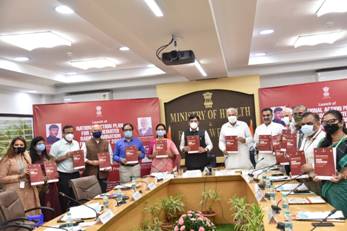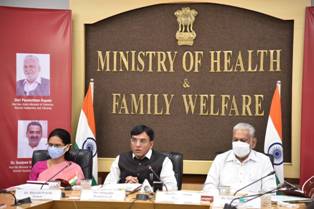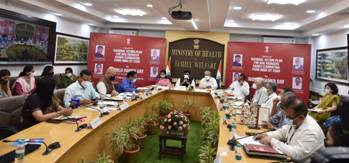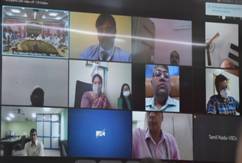New Delhi
On the occasion of Rabies Day, the Union Minister for Health and Family Welfare, Shri Mansukh Mandaviya and the Union Minister for Fisheries, Animal Husbandry and Dairying, Shri Purushottam Rupala, unveiled the National Action Plan for Dog Mediated Rabies Elimination by 2030 (NAPRE). Minister of State for Health and Family Welfare Dr. Bharti Praveen Pawar and Minister of State for Fisheries, Animal Husbandry and Dairying, Mr. Sanjeev Kumar Balyan were also present on the occasion.
The Ministers urged all the States and Union Territories to make Rabies a noticeable disease. Mr. Mansukh Mandaviya and Mr. Purushottam Rupala also launched a “Joint Inter-Ministerial Declaration of Support Statement” for the Elimination of Dog-borne Rabies by 2030 through the OneHealth Approach.

Speaking on the contemporary importance of the programme, Shri Mansukh Mandaviya said, “Man is not a solitary animal and acquires diseases from animals, which are also inhabited in his surroundings. Outside human range, the animals fight and enable viral transmission between each other. A holistic approach to health, taking into account human-animal interactions and their extensive interactions with the environment, can help in overcoming these challenges.” They also recognized that environmental factors such as rainfall, heat can also contribute to the increase of microbes and diseases, necessitating more research and greater awareness in this area.
Reminding everyone of the pandemic caused by the corona virus, he said, “Earlier people did not come out of the radius of 20-25 kms, this situation has changed a lot with modern life. It is now possible for a person to travel overnight across continents, enabling him to interact with people from different backgrounds in different countries. This has resulted in quick and uncontrolled transmission possible.”
The Union Health Minister also talked about the impact of the disease in the form of human cost. Sharing his experience of being exposed to a zoonotic disease while treating an animal, he recognized that the majority of those who suffer from the disease are those in the most productive years of their lives. “Animal-borne diseases like rabies take lives of people regardless of whether they are earning members of the families,” he said.

Mr. Purushottam Rupala cautioned the villagers about the danger of rabies in rural life, which he is known by the non-English name ‘Hadakwa’. He said, “Terror is created in rural areas just by taking the name of ‘Hadakwa’. The villagers will come out actively when they come to know that the name of rabies is Hudakwa. They will be active to assist the government in this noble endeavour.” He has advised the senior officers to be prepared for the use of the more familiar term ‘hadakwa’ in popularizing the activities under the scheme.
The Union Minister for Fisheries, Animal Husbandry and Dairying also suggested a comprehensive IEC to make people aware of the difference between a vaccine and a drug in the case of rabies; Many people have become confused and mistake a vaccine as a curative solution with medicine as a precautionary step. Even though every death caused by rabies can be prevented with a vaccine, once the disease has occurred in humans, there is no cure.
While agreeing to focus on one health approach, he also suggested setting up of a core body for better coordination between inter-ministerial bodies and other stakeholders.
Congratulating the National Center for Disease Control (NCDC) for preparing an action plan in consultation with the Ministry of Fisheries, Animal Husbandry and Dairying in such a short time, Dr. Pawar said, “Rabies is 100 per cent fatal, but 100 per cent vaccine-preventable. Rescue is possible. India accounts for 33 percent of the world’s rabies deaths. He expressed confidence that NCDC with vast experience in tackling zoonotic diseases like Nipah, Zika, Avian flu and surveillance of diseases like Influenza, Hepatitis would play a vital role in promoting holistic health approach of the Government.
Underlining the importance of the OneHealth approach, Mr. Balyan said that with animals being the root cause of two-thirds of all current diseases, new strategies need to be developed to address the health challenges of this era. He admitted, “Rabies is such a disease that it is not possible to entrust control to any one department. This disease affects humans and animals alike.


During the program, Animal Husbandry and Dairying Secretary Shri Atul Chaturvedi, Director, General Health Services Prof. (Dr.) Sunil Kumar, Animal Husbandry Commissioner Dr. Praveen Malik, WHO representative in India Dr. Roderico H. Ofrin, JS (HFW) Mr. Lav Agarwal besides other senior officials of NCDC and Union Health Ministry and representatives of other stakeholders were present. are.
